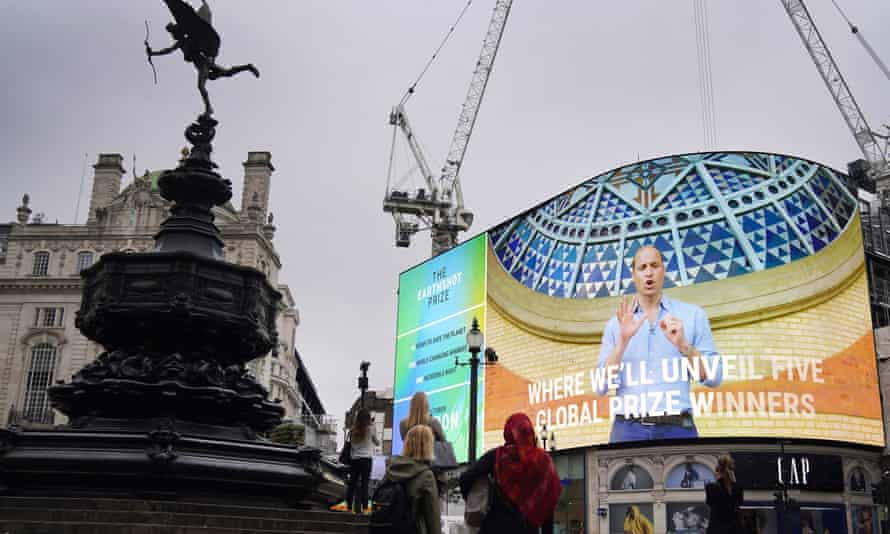Prince William’s Earthshot prize finalists include a schoolgirl and a city
Fifteen finalists chosen for providing innovative solutions to environmental challenges facing the planet

The first finalists in the Duke of Cambridge’s ambitious GBP50m global Earthshot prize to help repair the planet over the next 10 years have been announced and include a schoolgirl, a city and a country.
The prestigious global environment prize is designed to encourage solutions on climate change. The 15 inaugural finalists – three in each of the prize’s five categories – were chosen by experts and the prize council members.
Five will receive the top prize of GBP1m, while all will receive tailored support from global companies to scale their work. The winners will be announced at a ceremony next month.
Revealing the longlist, Prince William said: “Over half a century ago, President Kennedy’s Moonshot programme united millions of people around the goal of reaching the moon. Inspired by this, The Earthshot prize aims to mobilise collective action around our unique ability to innovate, problem solve and repair our planet.
“I am honoured to introduce the 15 innovators, leaders and visionaries who are the first ever finalists for the Earthshot prize. They are working with the urgency required in this decisive decade for life on Earth and will inspire all of us with their optimism in our ability to rise to the greatest challenges in human history.”
Created by William and the Royal Foundation, the prize is designed to lead an unprecedented global search for the most inspiring and innovative solutions to the environmental challenges facing the planet.
The 15 inaugural finalists, from 14 countries, were chosen from 750 nominations, which far exceeded the number expected for the prize’s first year. They include a 14-year-old schoolgirl, the city of Milan and Costa Rica.
Each of the finalists’ solutions excelled in the rigorous screening process and were assessed on their potential to create a game-changing impact around the world, their ability to help us reach our Earthshot goals while also positively affecting people, communities and the natural world, organisers said.
Each of the shortlisted finalists will receive support from the prize’s global alliance members, a network of private sector businesses around the world that will help scale up their solutions to realise even greater impact.
The five winners will be selected by the Earthshot prize council whose members include William. Queen Rania of Jordan and Sir David Attenborough. The awards ceremony will be held on 17 October.
In his introduction for the official Earthshot book, the duke said: “I wanted to recapture Kennedy’s Moonshot spirit of human ingenuity, purpose and optimism, and turn it with laser-sharp focus and urgency on to the most pressing challenge of our time – repairing our planet.”
The crucial moment was, while in Namibia, he made an early-morning trip to try to catch a glimpse of black rhino. “The rich wildlife that I saw thriving on that visit struck a real chord. The community conservancy model is a prime example of how a simple, positive solution can have wide-reaching benefits for both humans and nature,” he said.
“Most importantly of all, it is a success story that can be replicated and scaled. I wanted to find a way to bottle that innovation and community spirit and mass-produce it globally.”
Finalists shortlist in each of the five specified categories are:
Protect and restore nature category: the Pole Pole Foundation in the Democratic Republic of the Congo, a community-led conservation initiative protecting gorillas and local livelihoods; the Republic of Costa Rica for a pioneering scheme paying local people to help revive rainforest: Restor, Switzerland, an online conservation platform.
Clean our air category: the Blue Map app, China, an environmental database; Takachar, India, which creates products from agricultural waste; Vinisha Umashankar, India, a 14-year-old activist who has designed a solar-powered steam-ironing cart.
Revive our oceans category: Coral Vita, Bahamas, for restoring dying coral; Living Seawalls, Australia, for helping bring marine life back to coastal sea defences: Pristine Seas, US, a global conservation programme.
Build a waste-free world category: the city of Milan food waste hubs; Sanergy, Kenya, for converting human waste into safe products for local farmers; Wota Box, Japan, water treatment plant turning waste water into clean water.
Fix our climate category: AEM Electrolyser, Thailand, Germany and Italy, for developing green hydrogen technology; Reeddi Capsules, Nigeria, bringing affordable electricity to energy-poor communities; Solbazaar, Bangladesh, peer-to-peer energy exchange network.